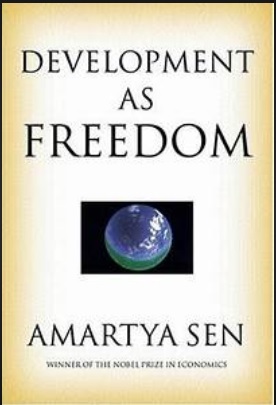BOOK REVIEW: Development as Freedom by Amartya Sen
Part 1:
For the last one week, I’ve been reading a book titled Development as Freedom by Amartya Sen. The author won a Nobel Prize in Economic Science in 1998. Therefore, he is a respected figure in the field of economics.
I came across very interesting information in the book and thought it a good idea to share in this blog.
Sen states that:
“There is every evidence that a country that even with relatively low income, a country that guarantees healthcare and education to all can actually achieve remarkable results in terms of the length and quality of life of the entire population.” Development as Freedom, page 144
The above statement from Sen confirms that investing in universal healthcare and education for all can lead to quality life for all. In fact this act can lead to economic growth. It’s true that if Kenyan government succeeds in its quest to achieve universal healthcare coverage, Kenyans will lead happy and longer lives.
Women Empowerment
Amartya Sen calls for more women empowerment through providing opportunities for women to acquire more school education as well as allowing women to receive more employment outside their homes.
Use of Public Resources
Sen makes his observations that many countries spend a lot of resources on programs which have no direct social impact on the taxpayers.
he says:
“Use of public resources for purposes where the social benefits are very far from clear, such as the massive expenditures that now go into the military in one poor country after another (often many times larger than the public expenditure on basic education or healthcare).” – Development as Freedom, Page 145
Amartya Sen is a champion of democracy. He makes his argument on the need to uphold democracy using famine as an example as quoted in the extract below:
“No substantial famine has ever occurred in any independent country with a democratic form of government and a relatively free press.” – Page 152
In strengthening the above example Sen gives an example of India which is a strong democracy despite its many challenges. He observes that India has never experienced famine since she received her from Britain in 1947 all because it is a democracy. He concludes that democratic regimes are more responsive to people’s demands that dictatorial/authoritarian ones. This is because democratic governments have to face elections after some years.
and;
“Famine cannot materialize in any country that is independent, that goes to elections regularly, that has opposition parties to voice criticisms and that permits newspapers to report freely and question the wisdom of government policies without extensive censorship.” Development as Freedom, Page 152
The above extract from the book highlights key elements of freedom in a country. That is:
- presence of opposition parties to voice criticisms
- regular free and fair elections
- Free press to report and question the wisdom of government policies
Kerosi Dotcom blog contributes to promoting freedom through interrogating the ‘wisdom of government policies.’
Importance of Political and Civil Rights
On political and civil rights Amartya Sen notes that:
“Political and civil rights, especially those related to the guaranteeing of open discussion, debate, criticism, and dissent, are central to the process of generating informed and reflected choices.” Development as Freedom, Page 153.
Importance of Activism by Opposition Parties
“The activism of opposition parties is an important force in nondemocratic societies as well as democratic ones.” Development as Freedom, Page 156
We should not be happy that a country does not have strong opposition parties because they play a critical role in voicing criticism of government policy which makes them better.
This brings us to an end of Part 1 of our book review. Part 2 is coming out soon. Keep tuned to Kerosi.com.
Read More:


